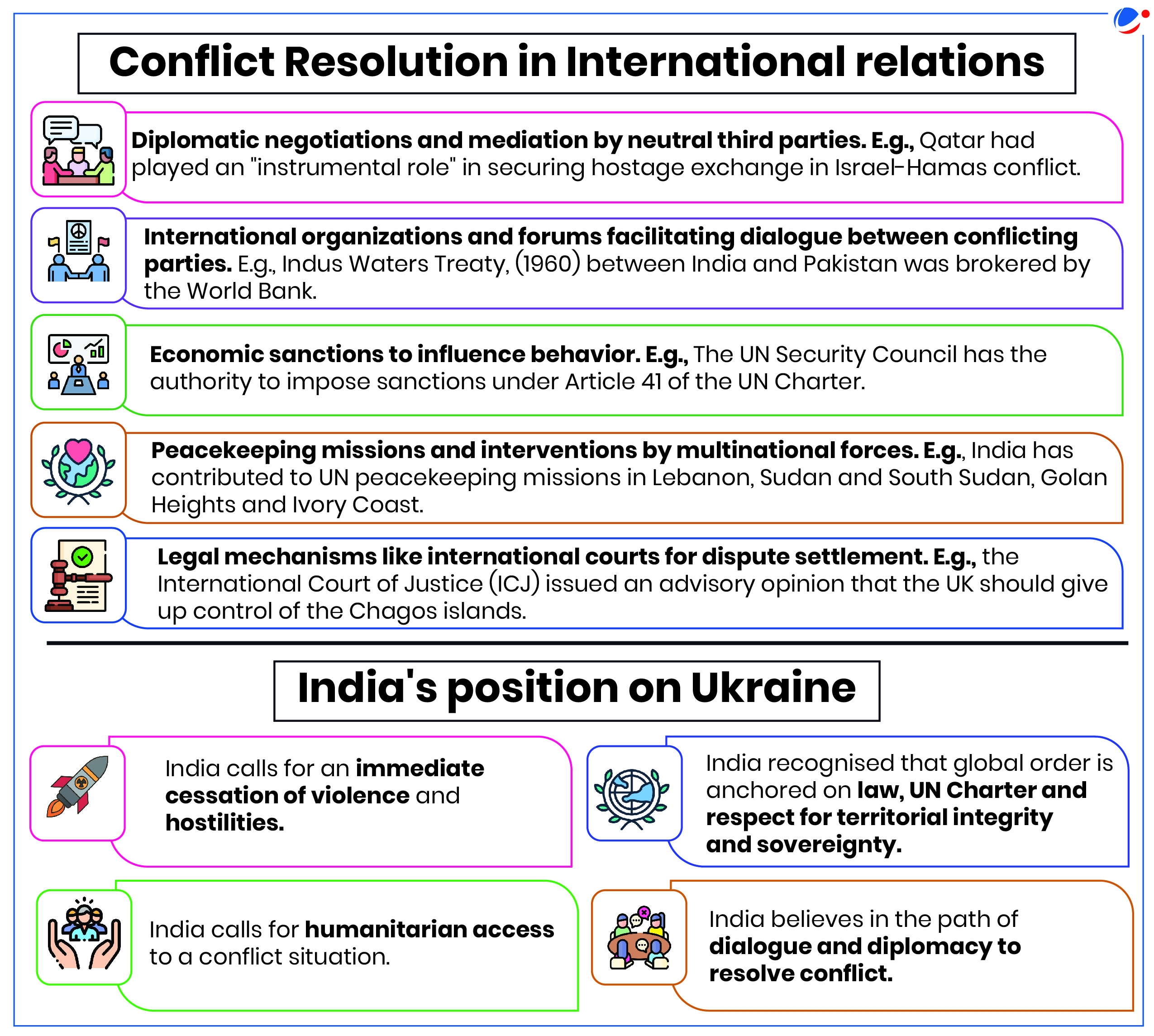Why in the News?
The Russian President stated that he's in regular contact with India, Brazil, and China regarding efforts to resolve the Ukraine conflict.

More on the News
- The Russian President's remarks came after the Prime Minister of India's visit to Kyiv where he held talks with the Ukrainian President.
- Previously, the PM of India had paid a visit to Russia.
- Two years into the Russia-Ukraine Conflict, Europe's largest conflict since World War II, shows no signs of ending soon.
- Russia did not attend the Swiss summit on peace in Ukraine.
- There is a 6-point Brazil-China proposal that calls for a Russia-Ukraine summit, that Ukraine has rejected.

India's Evolving Role as a Proactive Mediator in Global Conflict Resolution
- India as a proactive mediator: India's diplomacy has become more proactive, fostering closer international relationships and mediation in regional conflicts.
- E.g., India facilitated the end of Saudi Arabia's 70-year ban on using its airspace for flights to Israel in 2018.
- India's 5-S (Samman, Samvaad, Sahyog, Shanti and Samriddhi) approach' towards foreign policy: Symbolises India's independent foreign policy and uniquely positions India to mediate peace.
- India firmly believes dialogue and diplomacy, as ways out of the conflict: For instance, the Prime Minister of India along with other world leaders played a key role in preventing a nuclear strike by Moscow on Kyiv in 2022 (CNN report).
- India, as a voice of the Global South: India, actively pursued conflict resolution under its G20 presidency by highlighting the devastating war (Russia-Ukraine) outcomes.
- India's ancient philosophy of Vasudhaiva Kutumbakam' & rich history of purveyor of peace: Position India uniquely as a mediator and conciliator in world affairs.
- E.g., India has never subscribed to the doctrine of militarism and war in her history.
- India's proactive engagement with the world: In fostering dialogue and acting as a humanitarian first responder, "ever-ready to assist the global community in times of need". E.g. India was the first to provide drinking water to Maldives during its water crisis in 2014.
- This new identity has helped India to leverage her position to resolve conflict.
- Conflict Resolution Experience: India's experience in addressing both internal and regional conflicts, positions it as a potential peacemaker (see box).
India's historic efforts in peace mediation
|
Barriers to India's Role as a Mediator in Global Conflict Resolution
- Historical alignments: India's strategic partnerships limit perceived neutrality. E.g., India's abstentions on UN resolutions against Russia in the Ukraine conflict.
- Regional rivalries: Tensions with neighbouring countries affect India's mediator role. E.g., the India-Pakistan rivalry complicates potential mediation in Afghanistan.
- Economic priorities: Balancing diplomatic efforts with economic interests can constrain India's mediating act. E.g., India's oil imports from Iran.
- Limited global influence: India's diplomatic capacity, compared to established global powers like the USA and UK, is relatively limited, affecting its capacity to mediate complex international disputes effectively.
- Domestic Challenges: Internal issues such as internal conflicts, insurgencies, and political instability detract from India's ability to project itself as a model for peace.
- India has rejected third-party mediation on Kashmir.
Way forward
- Proactive role as a mediator: India could provide a neutral platform for a peace dialogue to all stakeholders. For instance, India could also host a global peace summit for this Russia-Ukraine war.
- Partnerships: India can contribute more to peace-making efforts, alongside like-minded nations powers (like South Africa, Brazil, Indonesia etc) and traditional Western peacemakers (Switzerland, Norway, etc.)
- Utilising experience: India should emulate its Korean crisis peace efforts by leveraging UN mechanisms, diplomatic leadership, non-alignment, and commitment to humanitarian values.
- Capacity building: Form peace teams within the Ministry of External Affairs and think tanks to study global conflicts and develop resolution strategies similar to Peace Research Institute Oslo (PRIO) of Norway.
Conclusion
India's role in conflict resolution is increasingly significant as it emerges as a voice for the Global South. Shifting from ad hoc to active international engagement, India's diplomatic efforts reflect its growing global influence and aspirations.



